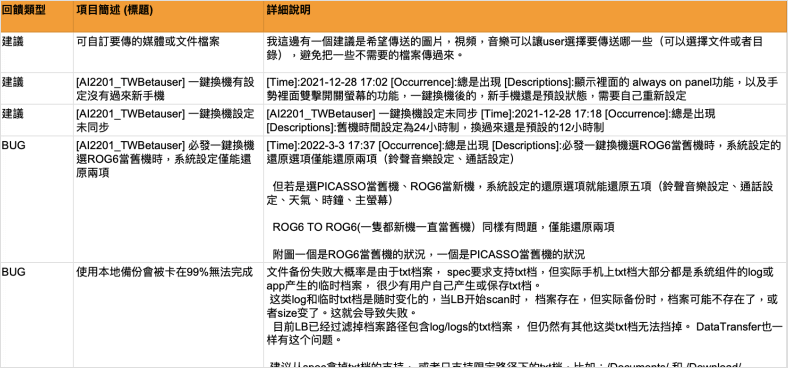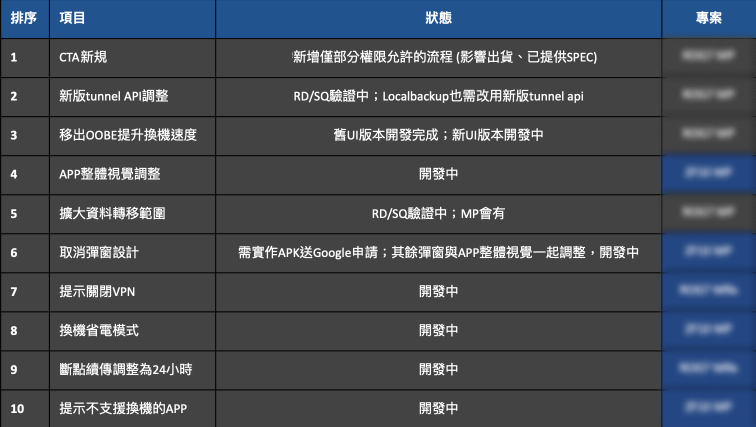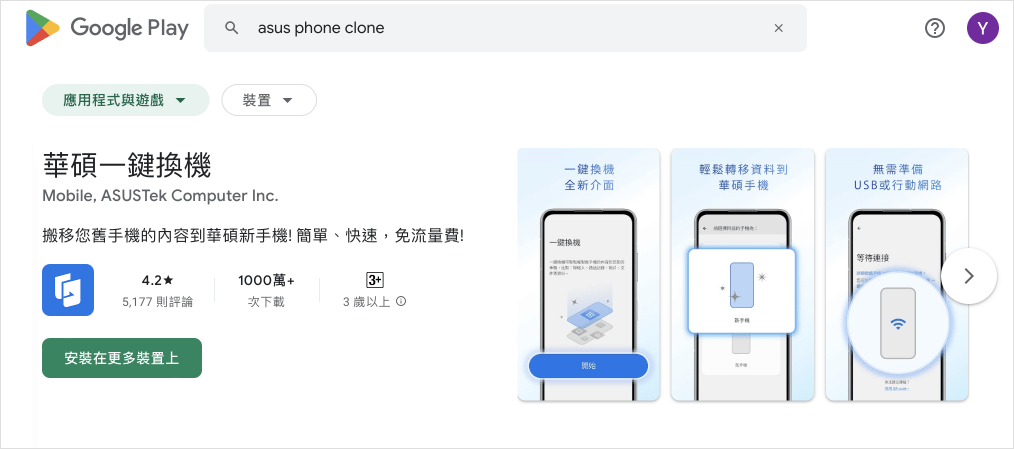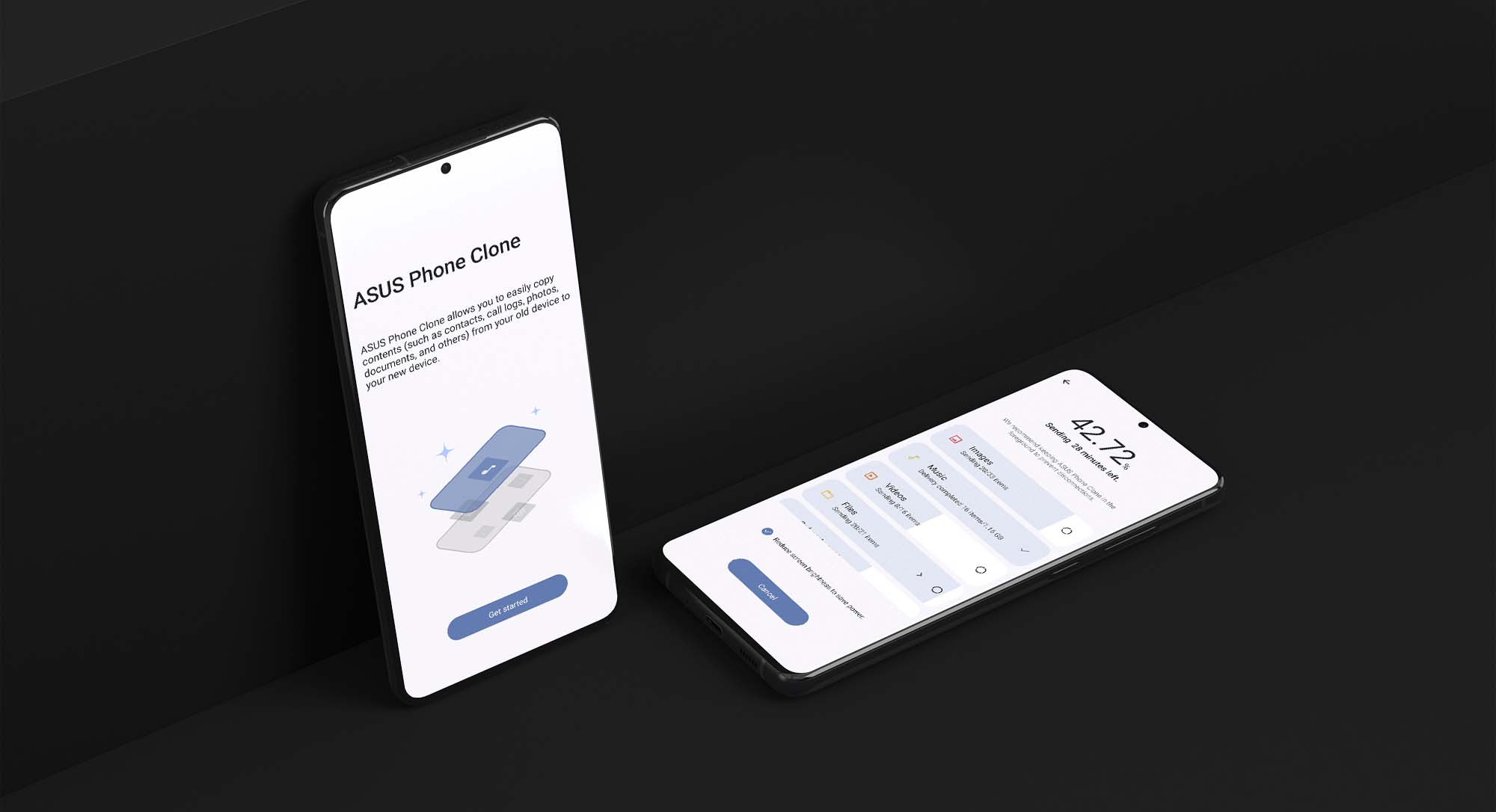✷intro✷
Integrate resources from all system apps and optimize existing designs.
#1 Lock down redesign scope in a short time
Phone Clone is a system application that has existed since the beginning of ASUS phones. When I first took over this app, I was immediately assigned an important task- app revision. I needed to understand the current complex specifications and plan the scope of redesigning with a new team in just one month.
#2 Strong relationships with other apps
Phone Clone app is responsible for transferring app data from old device to new device. It is necessary to integrate the resources of system applications during planning and development. That is, I spent a lot of time and effort sorting out the rules for the app to follow and working with different app teams.
Key drivers
→
As users' reliance on phone grows, a complete transfer and efficient process are critical to the success of Phone Clone app. So I based my designs on the following key areas:
#1 More transferable items
Transferring more items helps users avoid spending extra time and effort setting up their phone from scratch, allowing for uninterrupted use.
#2 More user-friendly interface
Having a more user-friendly interface design can make the data transfer process more efficient and give users a greater sense of security.
✷process✷
Examining current design
→
To reveal the problem areas of existing design, I personally experienced and evaluated the entire switch process and performance, and gathered users' feedback about their expectations for the product's features and what they are interested in achieving, thus gaining a basic understanding of the current app's experience and lacks.

Analyzing industry trends
→
To get a clearer picture of whether our products meet the basic specifications that current phone clone apps should have, I selected build-in phone cloning apps from eight major phone brands for competitive product analysis. The analysis results include their switch processes, features, visuals, performance and the range of data supported, from which I learned that our products need improvement in the processes, the range of data supported, and visuals.

Defining objectives of redesign
→
Based on the above information, compile all the feedback, insights, and group similar opinions. Besides, create a clear list of changes that want to make and point out what problems they aim to solve.
.png)
Creating design prototypes
→
For each changes that want to make, low-fidelity wireframes are initially created to facilitate smooth discussions with engineers about feasibility and requirements. High-fidelity prototypes will then be made and used to discuss further details such as dynamic interactions to gradually finalize the design.

Develop guidelines to support cloning
→
Since one of the changes that want to make is expanding the range of data supported, i provide a list of what is expected to support for phone cloning to app teams, and create a general rule for the app teams to evaluate whether to support and implement. In addition, resolve support issues for the application team during the process.
Handing off design to developers
→
Once the entire proposal is approved, start discussing, developing, and delivering specifications for all features with engineers, including user flows for usage process and error handling. Also, discuss with the UI designer to ultimately develop every interface that are suitable for users to use intuitively.
-2%201-2.png)
Tracking development progress
→
As a designer on the team, I not only provide design specifications, but also have to check development progress, review the demos, answer questions from team members (e.g. software engineers, test engineers), help marketing managers groom product stories for presentations, and arrange testing and release schedule, etc, to ensure everything goes smoothly from ideation to delivery.

Taking into account the system upgrade of old devices and the launch of new products, decide the best time to release. Besides, prepare the graphic and text materials required for the new version of the application to be put on the Google Play Store. After release, continue to observe comments and iteratively update and fix errors.

✷outcome✷
Only after entering the system does app's welcome page pop up to ensure that it can connect to 5 GHz Wi-Fi for faster data transmission.
In addition, the service statement is display as a hyperlink, allowing users to start the switching process at the same time when they agree to the statement, giving them a good first impression of the app.

Have more app options for users to back up data to reduce the time of resetting data on new phones.
.png)
Visualization of transfer progress
→
The entire app has been visually revamped, especially various data types will dynamically display the backup and recovery progress bars, allowing users to clearly understand the current backup status.
.png)
The power save button will be displayed when the switching process begins. Once the button is enabled, the screen brightness will be reduced until the switching process is completed to save power.
.png)



.png)




.png)
.png)
.png)
